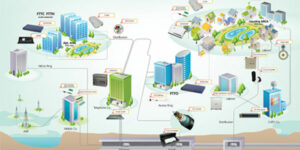INTRO: Smart cities are becoming popular around the world, as urban areas continue to grow and become more complex. A smart city is one that uses technology and data to improve the quality of life for its citizens, enhance sustainability, and boost economic growth. However, while technology is an important part of smart cities, it is only one aspect. The human side is equally important, and it that which empowers citizens and strengthens communities.
While technology is an essential component of smart cities, it is only one piece of the puzzle. The human side of smart cities, including citizen engagement, collaboration, and empowerment are equally important
One of the most significant benefits of smart cities is that they enable citizens to take control of their environment. Smart cities use IoT-based sensors and other technologies to collect data on everything from air quality to traffic patterns to energy consumption. This data is then made available to citizens, who can use it to make informed decisions about their daily lives.
For example, if a citizen knows that the air quality is poor in a particular area, he or she may choose to avoid that area or wear a protective mask there.
Another way that technology is empowering citizens is through the use of mobile applications. Many smart cities have developed mobile applications that allow citizens to report issues such as potholes, broken streetlights, and litter. These applications make it easy for citizens to communicate with their local governments and have their concerns addressed in a timely manner. This, in turn, helps to build trust between the citizens and their local governments.
Smart cities are also helping to strengthen communities by providing opportunities for citizens to come together and collaborate. As an example, some cities have developed online platforms where citizens can share ideas and propose projects that will benefit their communities. The process allows citizens to take an active role in shaping their environment and fosters a sense of ownership and pride in their communities.
Finally, smart cities are helping to create more sustainable communities. By using technology to reduce energy consumption, manage waste more efficiently, and promote sustainable transportation options, smart cities are helping to reduce their environmental footprint. This helps in creating a more liveable and healthy environment for everyone.
DISCLAIMER
Observations and options expressed in the article (except where specifically validated by market numbers and stats) belong to the contributing writer of the article, and are not necessarily indicative of the company’s position and stance in the matter.












